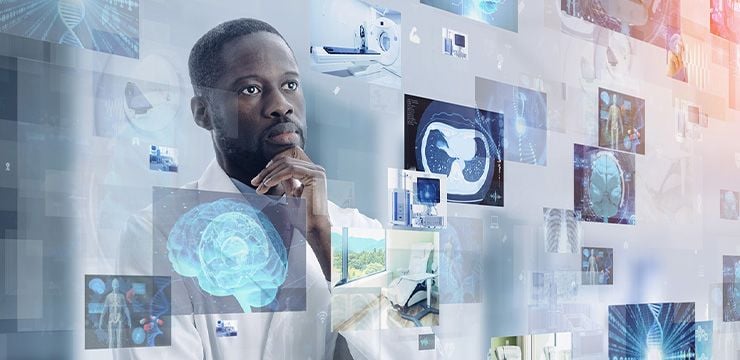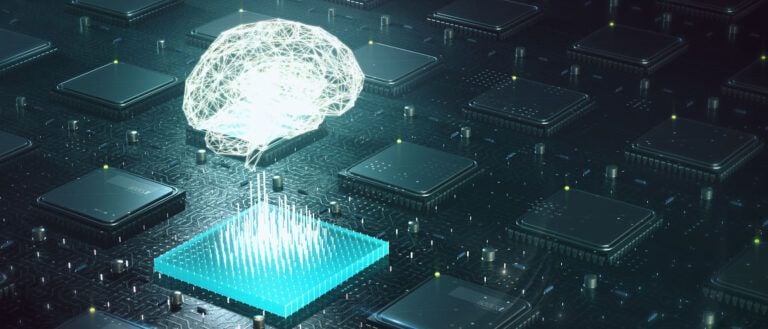How Machine Learning in Healthcare Works and Why it Matters

- Machine Learning in Healthcare
- Benefits of Machine Learning in Healthcare
- Application of Machine Learning and Artificial Intelligence in Medicine
- Types of AI Relevant to Healthcare
- Ethics of Employing Machine Learning in Healthcare
- Tasks that Machine Learning in Healthcare Can Handle
- Outlook for Machine Learning in Health Care
- The Future of AI in Healthcare
- Frequently Asked Questions
Over the foreseeable future, Artificial Intelligence (AI) and Machine Learning (ML) in healthcare will continue to play a significant role in transforming healthcare by driving innovations, efficient handling of medical data, and effective treatment of chronic diseases. this evolution. According to the Future Health Index 2022 report by Philips, for 60 per cent of healthcare leaders, investment in AI is a priority. Learn more about the use of machine learning in healthcare and the complexities surrounding it.
Machine Learning in Healthcare
Machine learning is a branch of artificial intelligence that uses data and algorithms to imitate how humans learn. It improves its accuracy as more data is provided to it, over a period of time. Machine learning in healthcare is used to improve the efficacy and the general nature of healthcare by using data and reducing human intervention. You can get a better sense of how it works in the benefits of machine learning in healthcare listed below.
Benefits of Machine Learning in Healthcare
Improvement in Diagnosis
Machine learning in healthcare can be used for better diagnosis using ML-enabled tools to analyze medical reports and images. For example, a machine learning algorithm can perform better pattern recognition and predict a disease based on training in similar cases.
New Treatments and Medication
A deep learning model can speed up new drug discovery for various illnesses. Machine learning can also be used for better analysis of the vast data collected from clinical trials to improve patient care and safety.
Cost Reduction
Machine learning can improve the overall cost efficiency of healthcare services by using technology in place of manual processes.
Better Tracking
Machine learning in healthcare can actively track and monitor health status and provide preventive recommendations to avoid major illnesses in the future.
 Opportunities for Machine Learning in Healthcare
Opportunities for Machine Learning in Healthcare
There are many opportunities for machine learning in healthcare. As per a research paper published by AMIA, they can be categorized primarily into the following:
- Automating clinical tasks
- Providing clinical support
- Expanding clinical capacities
Application of Machine Learning and Artificial Intelligence in Medicine
Machine learning and artificial intelligence are being extensively used in medicine. Common applications include but are not limited to:
- Patient diagnoses
- New drug discovery and development
- Communications
- Reading and analyzing medical documents and data
- Remote assistance in treating patients
Types of AI Relevant to Healthcare
As per a research paper published by Future Healthcare Journal, the following are the types of AI relevant in healthcare:
Machine Learning – Neural Networks and Deep Learning
Neural networks in healthcare can produce better diagnoses than would be possible to generate manually.
Deep learning can be used to analyze various records and images for early detection of disease and speed up the diagnosis.
Natural Language Processing
Natural language processing can analyze patients’ records for further information processing.
 Rule-based Expert Systems
Rule-based Expert Systems
Expert systems work on multiple collections of ‘if-then’ rules. Many Electronic Health Record (EHR) providers use these rule sets within their systems. However, their application is limited to a point where it is accurate and easy to understand. This is because when the number of rules is high, the rules begin to conflict, leading to inaccuracies. As a result, these systems are slowly being replaced by more data-based approaches and machine-learning algorithms.
Physical Robots
An example of this is the surgical robots that assist surgeons in performing complex surgeries by improving precision and reducing invasive procedures.
Process Automation
Machine learning can automate all the administrative tasks done in the healthcare industry. Along with saving costs, this can free up time for activities that directly focus on providing better patient care.
Ethics of Employing Machine Learning in Healthcare
The use of AI and ML in the clinical practice of healthcare raises some ethical challenges that need to be considered. Here are some of the areas of concern as per an article published by Elsevier:
-
Informed Consent to Use
This entails determining the extent of responsibility to educate a patient about the complexities of AI, including the kind of data collected and the possible limitations of using AI.
-
Safety and Transparency
Safety is one of the pressing concerns in using AI for healthcare diagnosis and treatment. Professionals need to ensure these systems’ safety and reliability and be transparent about them to minimize harm.
-
Algorithmic Fairness and Biases
An AI system is only as reliable and effective as it is trained (to interpret data and learn from it to perform a task with accuracy). Therefore AI makers should address this risk and minimize biases at every stage to ensure it doesn’t adversely impact the effectiveness of healthcare solutions.
-
Data Privacy
Patients must have adequate information about the collection and processing of their data to adhere to the fundamental privacy rights of human beings.
Tasks that Machine Learning in Healthcare Can Handle
Identifying and Diagnosing Critical Diseases
Machine learning in healthcare is useful for detecting and diagnosing critical diseases like cancer or genetic diseases. Furthermore, there are developments in image diagnostic tools which will become a part of the AI-driven diagnostic process.
Drug Discovery and Manufacturing
Machine learning in healthcare plays a critical role in the early-stage drug discovery process. Finding alternative paths for treating multifactorial diseases can be done with the help of AI-based technology. Personalized medicines and treatment options will also be possible in the coming years, using devices and biosensors with advanced health measurement capacities.
Maintaining Health Records
Maintaining health records has become much easier because of machine learning, saving time and money. In the coming years, ML-based smart health records will also help with improved and accurate diagnosis and suggest better clinical treatments.
Clinical Trials and Research
Machine learning has many advantages in clinical trials and research because it helps researchers access various data points simultaneously. In addition, it leverages real-time monitoring, data access of the trial participants, and electronic records, which minimize data-based errors.
Data Collection
Nowadays, researchers and medical practitioners are crowdsourcing large amounts of data from people with their consent to improve the identification and diagnosis of critical diseases.
Outlook for Machine Learning in Health Care
Machine learning in health care is growing faster than people may realize. Changing lifestyles, increased life expectancy, and rising prevalence of diseases have contributed to the rising demand for better and more accurate healthcare solutions. For example, by 2024, 40 per cent of healthcare leaders will focus on investment in AI for better healthcare facilities.
The Future of AI in Healthcare
The future of AI in healthcare is moving towards delivering truly proactive and predictive healthcare systems. But it’s a long and complex journey that requires multiple stakeholders such as governments, technology companies, and healthcare providers to work in sync. In addition, as AI penetrates deeper, there will also be the need for increased security and the establishment of global standards to protect how AI uses data.
Frequently Asked Questions
Why Do We Need Machine Learning in Healthcare?
Machine learning in healthcare can be used to improve healthcare solutions through:
- Better diagnosis of patients
- Better medications and treatment
- Enhanced communication
- Reading and analyzing medical documents and data
- Better accessibility to quality healthcare
Who Uses Machine Learning in Healthcare?
Pharmaceutical companies, technology companies, healthcare providers, and governments are the types of organizations that use machine learning in healthcare.
How Does AI Reduce Costs in Healthcare?
AI reduces costs in healthcare by replacing manual tasks with technology, improving the predictability of diseases, thus allowing for preventive measures and reducing overall inefficiencies in the healthcare system.
Machine learning in healthcare is only growing in importance, and it will undoubtedly open a treasure trove of opportunities. Explore machine learning courses on Emeritus to get a competitive edge in this field.
By Priya S.
Write to us at content@emeritus.org
















